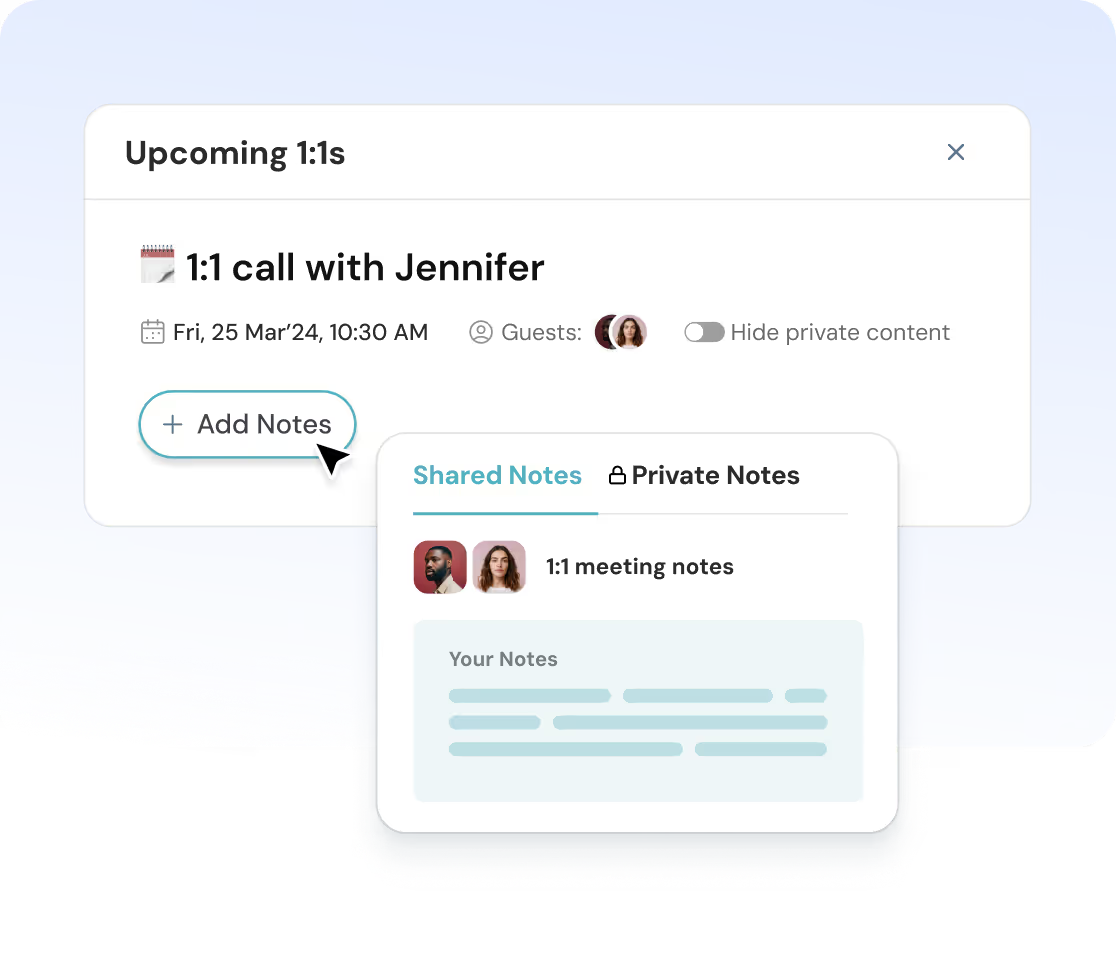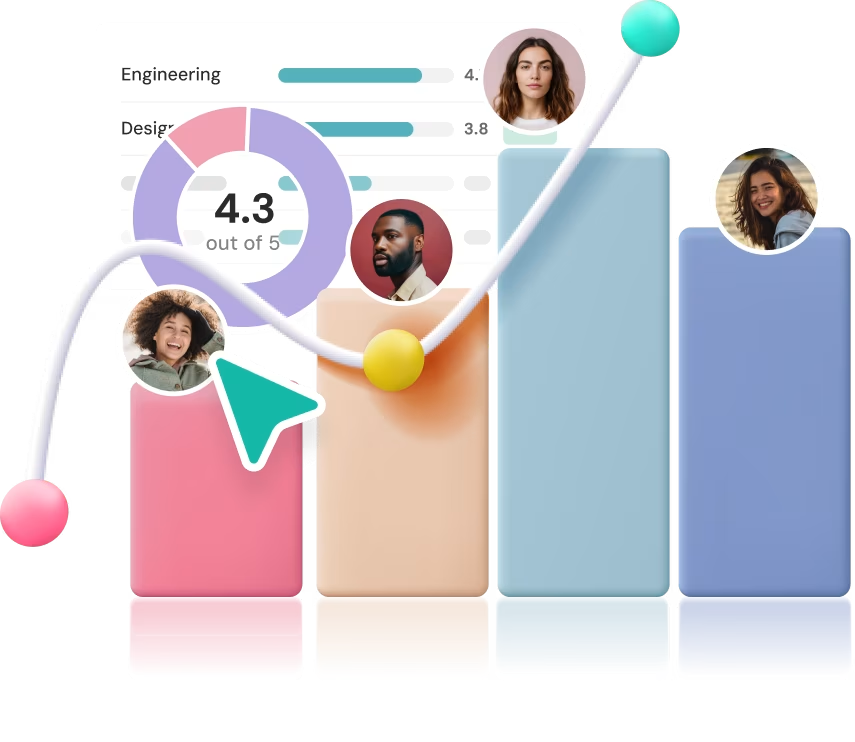64% of employees have an employee feedback program. But only 10% say they're engaged after receiving negative feedback. [Gallup]
Performance review meetings are an excellent way to sharpen the skills and mindset of your employees, but if not done the right way, it can do more harm than good.
Managers need to conduct performance review meetings with utmost care, especially when delivering negative or constructive feedback.
Today, let us look at some effective tips managers can use to conduct successful performance review meetings.
For a performance review meeting to be most effective, it must have a format, structure, and, most importantly, an agenda. It gives the participants a clear idea of what to expect from the meeting, what possible topics will be discussed, and what the conclusion will be.
The manager must set an agenda for the review meeting and communicate it with the employees so that both parties are on the same page. Also, an agenda helps make sure that the meeting is free of unnecessary topics that could take longer time to cover.
- As a manager, you can ask for input from your employees in designing the right agenda for the review meeting. This way, the insights from employees can be included during the performance meeting, which makes it relevant for employees as well.
- While setting the agenda, it has to be made sure that the roles of both parties are mentioned clearly. The agenda of the meeting could be to seek certain information from the employee, share information, or make a decision collaboratively. It could be either one or all of these. In any case, employees can prepare in advance if the agenda is structured with a clear purpose.
- Each agenda topic has to be allocated a particular amount of time, which can be divided depending on the relevance of the topics.
- Managers can make amendments to the agenda if they feel like certain topics are to be discussed more.
Performance review meetings are a great way to have a clear one-on-one conversation with employees and understand their sentiments towards their job role and the organization as a whole. To make things even more effective during the meeting, managers can follow these nine tips:
When it comes to conducting a great performance review meeting, the environment plays a major role. Employees tend to get stressed and out of their element during performance reviews as they consider it to be a way to point out their shortcomings.
Because of this exact reason, managers must make sure that the environment they choose to conduct a review meeting is calm and has a positive spin to it. Managers can go for a well-lit room with good ventilation, and can even seek the help of plants to make things green and fresh.
Rather than conducting a review meeting cooped up in a closed cabin, an open space would be a great choice. Make sure that the privacy of the meeting is not compromised.
There are different types of performance reviews that managers use.
Some of them include 360-degree feedback, rating scales, narrative feedback, and peer reviews.
The manager must take into consideration the kind of topics they wish to discuss with the employee and then decide on the type of review which would be best to measure and analyse the performance of the employee. Usually, for an effective evaluation, managers use a mix of some of these performance review types.
In certain areas, more narrative feedback might be best, and in other cases, an objective rating scale can be used. Whatever the case, managers have to make sure that they fix a format and type beforehand.
A performance review is all about asking the right questions. Managers should invest time in framing questions carefully and thoughtfully so employees feel comfortable, not cornered.
Start with open-ended questions that encourage self-reflection, such as:
- “How do you feel you’ve performed in the past quarter (or cycle)?”
- “What goals are you aiming for in the next cycle?”
- “What are your personal growth aspirations for the coming period?”
These questions signal that you value the employee’s perspective and career goals.
Once the employee shares their thoughts, the manager can follow up with their observations — highlighting what went well, where improvement is needed, and what expectations are set for the next phase.
If compensation or benefits are part of the discussion, ensure that conversation is transparent and empathetic. You can include questions such as:
- “On a scale of 1–5, how satisfied are you with the offer or rewards discussed?”
- “Is there anything we can improve in our performance review process for next time?”
Closing the review with employee feedback not only helps you improve future appraisals but also reinforces trust and collaboration. When employees feel heard, they walk away from the meeting motivated and less anxious.
When giving feedback, whether its positive or constructive, managers must ensure the performance criteria are transparent and well-defined. Clear expectations make the evaluation process fair, objective, and free from bias, while also helping employees understand exactly how their performance is being measured.
Here are a few ways to maintain clarity in your performance reviews:
- Set clear goals for growth.
Ensure the goals you define are closely tied to the employee’s job responsibilities and align with both their personal aspirations and the organization’s broader objectives. - Make goals measurable.
Use the S.M.A.R.T. framework to create goals that can be easily tracked and evaluated. This ensures transparency and accountability. Use ThriveSparrow's OKR platform to effortlessly track goal progress, and predict completion times. - Connect individual goals to company outcomes.
Help employees see how their work contributes to the organization’s success. When people understand the bigger picture, they’re more motivated and engaged in achieving it. Again, OKRs are a strategic and surefire way to ensure organizational alignment and success. - Ensure mutual understanding.
Before ending the review meeting, confirm that both you and the employee are aligned on the expectations, goals, and next steps. This reinforces clarity and prevents future miscommunication.
By keeping performance criteria clear and measurable, you foster trust, accountability, and a shared sense of direction.
At the end of a performance review, managers provide feedback to the employees.
Rather than giving generic and vague feedback, managers have to make sure that the feedback is actually actionable.
Set up and schedule check-ins to measure the progress of the individual development plan and provide amendments wherever needed. It makes sure that the development of employee performance actually takes place and that the purpose of the review meeting is fulfilled.
Performance review meetings are to be conducted in such a way that employees have an opportunity to state their minds regarding the feedback they receive. While employees speak their minds, managers have to make sure that they actively listen to what the employees have to say.
Let’s be real here: not all feedback can be positive in nature.
There will always be areas where an employee could have performed better. So, the key lies in how that message is delivered.
When communicating areas for improvement, managers should use constructive, forward-focused language.
Instead of listing mistakes alone, explain what can be done differently next time. This approach keeps employees motivated, not defensive, and helps them see feedback as a chance to grow.
Here are a few examples of how to reframe feedback constructively:
- ❌ “You don’t speak up enough in meetings.”
✅ “You have great insights during one-on-one conversations. I’d love to see you share more of those ideas in team discussions — they’d really add value.” - ❌ “You handled that client situation poorly.”
✅ “That client call was tricky. Next time, try summarizing key points before closing — it can help prevent miscommunication and show confidence.” - ❌ “You need to stop relying on others.”
✅ “You have strong problem-solving skills. I’d love to see you take more ownership of decisions in the next project.”
By keeping feedback balanced, specific, and action-oriented, managers can turn difficult conversations into meaningful opportunities for improvement.
Read more: 70+ Performance Review Example Phrases and Comments
Always conduct performance review meetings one-on-one, and if possible, in person. One should never conduct performance meetings as a group because it will not give the desired results, and above all, the employees might not be comfortable with it.
ThriveSparrow is the right performance review platform for your organization. You can save time and effort by scheduling 360-degree feedback surveys; and generate individual development plans instantly for multiple employees.
Access your people's goals and feedback all at one place, and empower yourself with a clear agenda.
Add clear next steps, reflect privately, and prepare confidently for the next conversation.

Save prep time while keeping every meeting structured and focused.
Explore ThriveSparrow for free now. Become the HR that redefined organizational performance.
Do not shy away from properly acknowledging and recognizing an exceptional performance when you see one. There will always be some employees who go above and beyond to deliver exceptional performance.
In such cases, rather than merely congratulating them, make it a point to properly acknowledge it.
Beyond anything, people appreciate recognition, especially from their managers.
Preparation is Key
No matter how many times you have conducted a performance review, preparation is always necessary.
To take things to the next level, ThriveSparrow can help you with customized employee feedback and performance review surveys. It is a great way to understand how employees feel about certain topics and what changes could be made to the performance review to make it even more effective.
Investing in the right tool like ThriveSparrow can help catapult the growth of your organization to many levels.
















